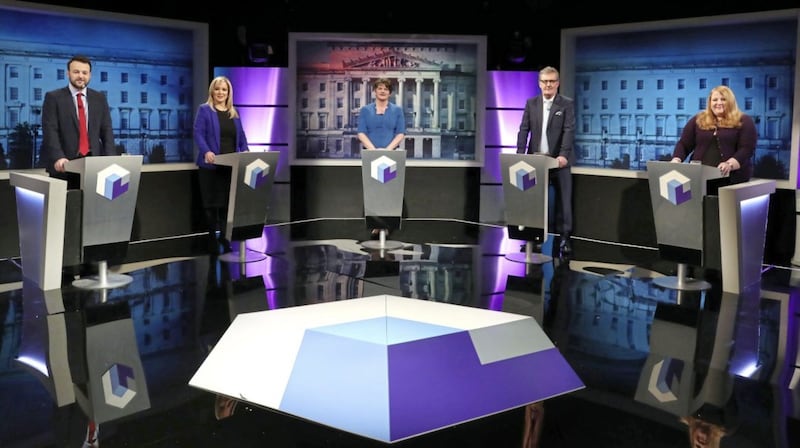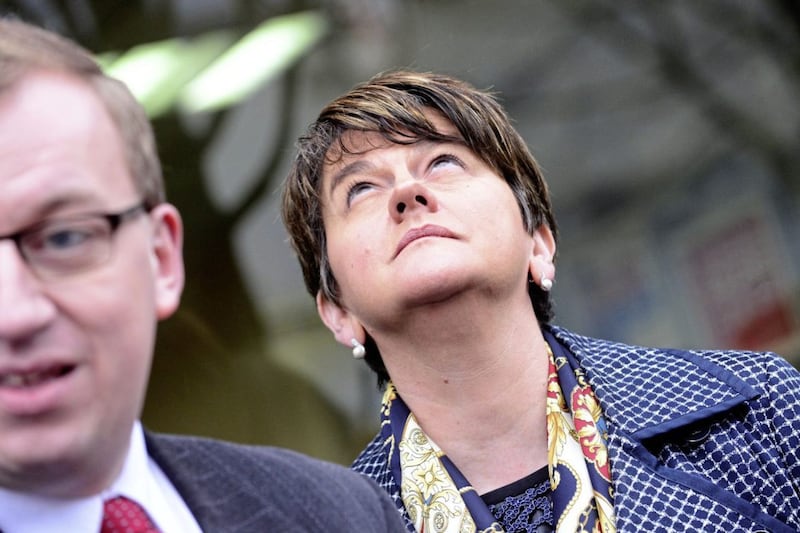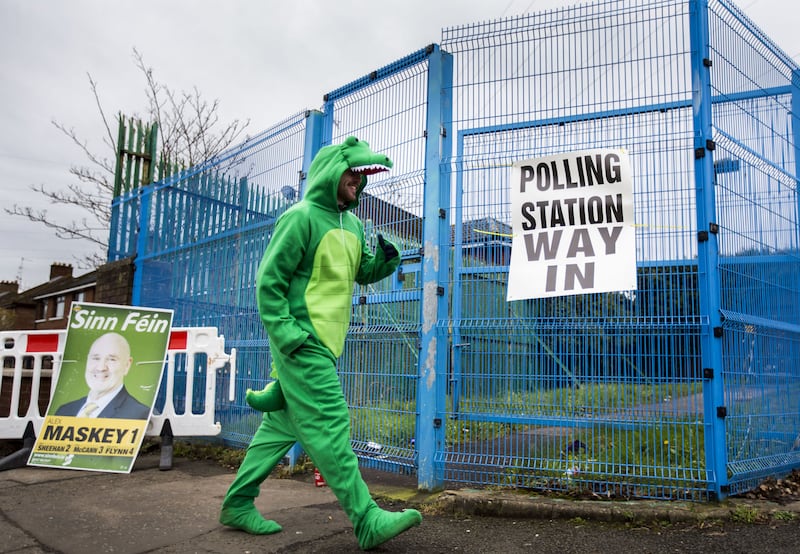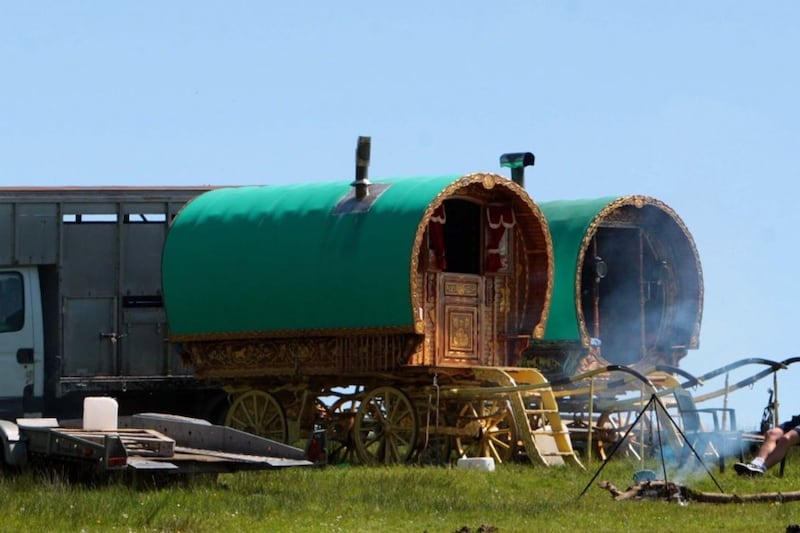Turnout in the Northern Ireland Assembly election has hit its highest level since the year of the Good Friday peace agreement.
Almost two thirds of the electorate voted in yesterday's poll - with the future of powersharing hanging in the balance.
Overall turnout jumped to 64.78%, up from 55% last year with a number of individual constituencies recording a rise in excess of 10%.
Soaring viewing figures for the two main TV leaders' debates had hinted at a surge in voter engagement, something that appears to have been borne out on polling day.
What impact the increased turnout will have on the results will only start to become clear when the first results start to filter through during Friday afternoon.
Follow our live coverage here.
Turnout compared to 2016:
Lagan Valley turnout 62.57% vs 53.19%
South Down 66.21% vs 53.8%
Newry and Armagh: 69.41% vs 54.44%
Upper Bann 62.54% vs 59.32%
West Tyrone: 68.89% vs 59.86%
Belfast North: 61.77% vs 52.48%
Belfast West: 66.76% vs 57.8%
Belfast East: 63.02% vs 65.74%
North Antrim: 63.22% vs 52.93%
Mid Ulster: 72.38% vs 58.75%
South Antrim: 62.4% vs 51.01%
South Down 66.21% vs 53.8%
East Antrim: 60.12% vs 51%
Foyle: 65% vs 56
Strangford: 60.94% vs 50.25%
South Belfast: 63.96% vs 54.25%
Fermanagh and South Tyrone: 72.61% vs 64.55%
East Derry: 62.69% vs 50.79%

With her now infamous 'hungry crocodile' remarks three-and-a-half weeks ago, Arlene Foster set the tone and template for the election campaign.
She had previously warned that it would be "brutal" – a clear indication that last year's non-aggression pact with Sinn Féin had expired.
There has been much debate over what this election was really about but few could argue that despite the DUP's best efforts, the campaign's focus was very much on its leader.
Mrs Foster was at the centre of the Renewable Heat Incentive (RHI) storm which precipitated the poll and she is leader of the biggest party contesting the election, so naturally she should attract a lot of attention.

The contrast with last May, however, is that much of the attention was unwelcome, evidenced perhaps by the fact that she refused to take questions at the DUP manifesto launch, citing "man flu".
On the defensive for much of the time, with the added distraction of controversy around the secret donor behind last year's Brexit ads, the DUP strategy has been simple: its own take on 'project fear', with countless references to Gerry Adams and Sinn Féin's 'radical republican agenda'.
Its record in government has barely been cited during an unashamedly populist campaign, though this being Northern Ireland that doesn't necessarily translate into a poor election result.
All eyes will be on the first preference totals today as Arlene Foster finds out exactly what impact the RHI scandal has had on her party.
The Ulster Unionists arguably have most to gain from this snap election but Mike Nesbitt's ill-thought-out pledge to give the SDLP his second preference may have thwarted his aim of making significant inroads into the DUP's vote.
Average performances during the televised leaders' debate are also likely to hinder growth.
The Ulster Unionists need one gain at the very least to demonstrate that there is an appetite among voters for change, but mixed messages about transfers on the campaign trail haven't helped.
Sinn Féin meanwhile has wallowed in the free publicity that came courtesy of the DUP.
It chose to make light of the crocodile characterisation about demands for an Irish language act, which fed into its new narrative around DUP disrespect and intransigence.

In common with Arlene Foster's party, republicans sought to ignore much of the last decade and their partnership in government with the DUP.
They instead fought the campaign by highlighting 'the whiff of corruption' and the lack of Irish language legislation or a bill of rights, overlooking the fact that the latter two did not feature in the joint programme for government that both parties signed off at the end of October.
This election is a first test of how the party polls without Martin McGuinness as its figurehead. New northern leader Michelle O'Neill was competent in her hustings appearances but still lacks the assuredness and spontaneity of her counterparts.
Notably, the tension that emerged with Mrs Foster during Tuesday's night's leaders' debate on BBC wouldn't indicate an easy relationship if the executive does get up and running in the near future.
However, despite starting on the back foot on RHI before Christmas, a polarised campaign is thought to have energised the Sinn Féin support base and it will hope to emerge from the election in a stronger negotiating position.
The SDLP has been tenacious and its leader impressive but because there is so little to differentiate it from Sinn Féin, its focus has been on maligning its larger nationalist rival's record in government.
Given that it too was in the executive for much of the past decade, this may appear a little disingenuous to voters.
Like the UUP vis-a-vis the DUP, the SDLP needs to arrest its steady electoral decline to show it remains relevant but unlike Mike Nesbitt's party, it didn't have the benefit of an RHI scandal with which to attack Sinn Féin.
Alliance, meanwhile, was accused in these very pages of going awol just a fortnight ago and beyond some controversy over social media posting, the party's campaign was generally low key.
Like the smaller parties including the Greens, People Before Profit and TUV, it will hope that anger at the record of Stormont will translate into a greater share of seats in the assembly chamber.








